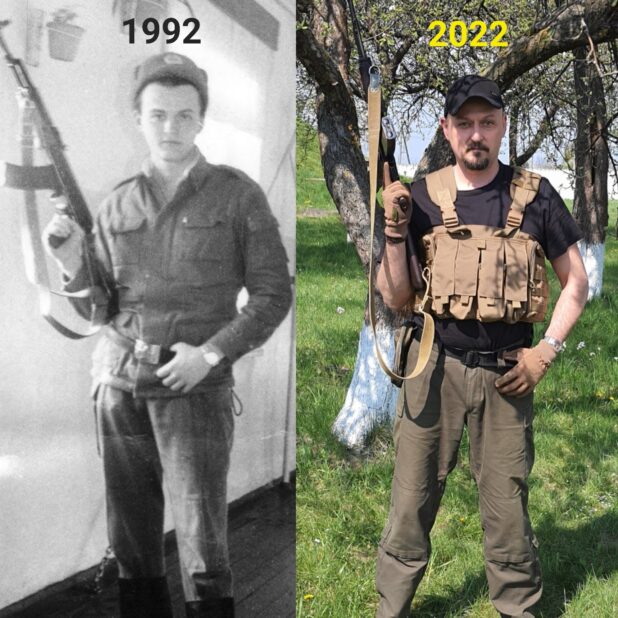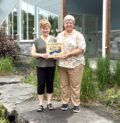Headline News
Campaign aims to keep Ukrainians warm during winter
September 28, 2022

By Nate Smelle
It has been more than seven months since Russian president Vladimir Putin ordered his country’s armed forces to invade Ukraine. Although the Office of the United Nations High Commissioner for Human Rights announced on Sept. 18 that 5,916 Ukrainian civilians had been killed since the invasion began, The New York Times recently reported that the actual number of civilian casualties is likely in the tens of thousands.
Both militaries have suffered massive casualties on the battlefield, with the Ukrainian death toll topping 9,000; and, Russian forces losing some 25,000 lives. As a result of the conflict, it is estimated that more than 6.6-million refugees have fled Ukraine in search of sanctuary outside the war zone.
Since the invasion began, Tetanya Moiseyeva of Barry’s Bay has been working tirelessly to help Ukrainians survive the destruction being unleashed on their homeland. By way of her campaign for Ukraine, Moiseyeva has helped five families escaping the war to settle in the Madawaska Valley. She also organized a fundraiser that brought in approximately $110,000 – $80,000 to support families still in Ukraine , and $30,000 for the families she helped find safety here in Canada.
With winter approaching fast, Moiseyeva has now turned her attention to assisting the people of Ukraine in another manner … helping to keep them warm as the battle rages on. Although Moiseyeva immigrated to Canada two decades ago, her roots still run deep in Ukraine. She decided to shift the focus of her campaign after receiving correspondence from Mikhailov Bohdan, an old school friend who is now fighting with the Ukrainian military against the Russians.
To help raise awareness of the state of terror that the people of Ukraine are experiencing every moment of every day, Moiseyeva asked her friend to share his account of life during wartime with Bancroft This Week.
Born in Zaporizhzhia in 1973, Bohdan oved with his family to Nemishaeve village in the Kyiv region in 2012. He first became active in the Ukrainian resistance two years later, when the Russians invaded Ukraine and annexed Crimea in 2014. Since then, Bohdan along with his family and friends, have been helping the military and the hospital located in the neighbouring City of Irpin. Bohdan recalls what it was like to wake up on the morning of Feb. 24, to the thundering explosions of Russian missiles hitting cities throughout Ukraine.
“Although we expected that Russia would go further than Donetsk and Luhansk regions, we did not fully believe that this was possible in the 21st century, in the centre of Europe,” said Bohdan.
“My wife and I lived 30 kilometres away from Kyiv, in the village of Nemishayevo. My daughter was in Kyiv. Kyiv was shelled, and at six in the morning I went to pick up my daughter to take her to us. We thought it would be safer. I got to Kyiv quickly, there were not many cars. But from Kyiv, there were already traffic jams, everyone was leaving the city.”
In about an hour and a half, Bohdan said they reached the exit to Kyiv, and were headed for Irpin. Noting how heavy the traffic was on the Novoirpinska Highway, he said they saw the first evidence of the destruction as they entered the City of Irpin via Soborna Street.
Describing what they witnessed that day, Bohdan said, “There was black smoke on the horizon and many helicopters in the sky. It was Russian troops storming the airport in Gostomel, landing troops. Several helicopters were shot down by our military.”
After arriving home around 5 p.m., Bohdan said they turned on the TV and learned that the Russians had launched a large-scale invasion. By the next day, he said they were already cut off from Kyiv, unable to escape to the north or the west.
“From the north, and from the western side of us, there were already columns of the Moscow horde,” Bohdan said. “And although the warriors of Ukraine had already begun to neutralize the [Russians], we in the village were blockaded and had almost no weapons. The head of our community, Perevoznyk Petro Petrovych, fled from the village on Feb. 28, leaving the community to fend for themselves. Before that, we tried to get weapons, at least machine guns, through him, but in vain.”
On Feb. 26 and 27, Bohdan said they gathered with people from a neighbouring village and built a barricade on the Vorzel Road, at the entrance to the village, from the Borodyanka side.
“There were about 30 of us, and we had up to 10 machine guns and molotov cocktails.,” said Bohdan. “We were waiting for a column of Russian vehicles from Borodyanka. Was it scary? Yes, it was. Cocktails and some machine guns against tanks… That sort of thing. But we understood that we had to do something. That the earth must burn under the occupiers feet.”
Luckily, Bohdan said they were warned by a man in military uniform to disperse because the Russians had learned of their position and went around the barricade through the adjacent fields. Having successfully prevented the Russians from using the main road t through their village, he said they headed for home. While they were walking, Bohdan said there were two Russian fighter jets circling over the village, possibly on a reconnaissance mission.
During the early days of the occupation, Bohdan said the Russians bombed Borodyanka, destroying houses with civilians still inside; despite the fact he said the Ukrainian military was not there. Noting that the fighting began nearby in the cities of Vorzel, Bucha, Irpin, he said, “Day and night, everything was exploding, shooting around… Airplanes, helicopters were flying… Convoys of [Russian] vehicles were driving. Our people were shooting at them with artillery, with jewelry precision, on the roads, in the fields. Even on the central streets of Irpin. Very carefully. [Russians] were shooting everywhere. Houses were destroyed, civilians were killed. Our village, if I may say so, was lucky. Everything flew above us, and there were not many were some headquarters of the Russians in the village.”
On Feb. 27 or 28, Bohdan said the electricity in their village was cut off. Mobile communication, and the Internet also disappeared. Making communication even more difficult he said, was the fact there was only one local operator still working. Although there was gas in the tank for heating, Bohdan said the boiler wouldn’t work without electricity.
“It was cold. We slept with our clothes on, under blankets. How did you sleep? We hardly slept at night, because everything was exploding around. We sat in the corridor. If we managed to sleep at least two, three hours, it was good. We were not hungry at all. We ate once a day, but we ate through force, because we had to. There was food. We united with our neighbours, shared with each other what we had.”
As the invasion continued, Bohdan said Russians set up checkpoints around the village. He said they drove around the village, looking for some way to get closer to Kyiv. Because he and his family live on a dead-end street, he said the Russians did not come to their block, but they did however stop by a school near them, where women. children, and senior citizens were hiding in the basement. In early March, Bohdan said the Russians began shelling the neighbourhood where they lived with mortars and tanks.
“We were lucky again,” he said. “It did not reach our house. But it hit the school. One shell fell a little further from the school. The explosion knocked out the door to the basement where people were hiding. The second shell fell near the school itself. At that time there was a car with volunteers – a man and a woman brought food, having broken through the blockade. The man died on the spot, the woman was wounded. My guys and I were standing in the yard, near the cars. After the explosions, everyone rushed to the ground and behind the cars. The fragments flew to us, but it was about 100 metres, and they were not big. It flew past me. I was just jumping behind the car, and as in a slow motion movie I saw a hit in the car window, about a couple of centimeters from my shoulder. Lucky again… No one else was injured from our side. Only those volunteers.”
Prior to the Russian invasion, Bohdan said they would visit their friends – a Ukrainian soldier, his wife and two sons – on the other side of the village almost every day. Although it is only about 10 minutes away, he said they were unable to visit them any more, because the Russians would often shoot at civilians while they are driving on the roads.
Around March 5 and 6, Bohdan said people began to gather themselves and try to leave by car, even though there was no official evacuation planned. On the first day, the Russians let one group of cars leave, but they were searched extensively, and any laptops or smartphones were confiscated.
On the second and third day, more columns left the village, despite reports that the Russian army was shelling cars of civilians, even those with the word, “children” painted on them. For the moment, Bohdan and his family remained in their home. On March 7, he said they ran out of gas and had to resort to cooking food on bonfires. When the Russians started “shooting more,” Bohdan said he and his family decided to leave as well. Gathering the members of three families into two vehicles, their journey to find safety began.
Bohdan, along with his wife, daughter, and their dog piled into one car, while their friends family and a driver took the other one. With the others from their village leaving at the same time, there were about seven cars in total, he said.
“We passed one Russian checkpoint. There were some conscripts there. Young, 18-20 years old. They were scared themselves. They looked in the trunks, did not take any- thing, and let us pass. Then, about 50 cars gathered from other villages. They were driving along the forest belts, locals advised where to go, where to stay, how long. Because there were battles, shelling around. We almost got under hail. But the shells did not fall very close.”
When Bohdan and his family made it to the Zhytomyr highway, he said they could not believe what they saw. Vividly describing the catastrophic scene, he continued:
“And there, a spectacle … the apocalypse. I have not even seen such a thing in the movies. Burnt out equipment of the Russians. Destroyed civilian cars. Just abandoned… Warehouses, gas stations, houses are burning around… the road is covered with shrapnel. It was scary to break the wheels.”
Before they reached Makarove, Bohdan said the column of vehicles they were travelling with suddenly came to a stop for some reason. All of a sudden, he said the shooting started.
“I thought they were shooting at our convoy… But no. Maybe there was a fight in the forest,” Bohdan said.
When they finally reached Makariv, Bohdan said they were overjoyed to see the first Ukrainian soldiers on their journey. After passing through the first “big” Ukrainian checkpoint on their exodus as they neared, Zhytomyr, he said they stopped near a cafe, where there was coffee, hot dog, and cigarettes. Following a brief rest, they continued towards Lviv.
Once there, Bohdan said the friends, and two women they picked up along the way, were reunited with their friends and families. Staying with friends of theirs’ in a village near Lviv, he said they were able to wash and sleep for the first time since Putin’s army invaded on Feb. 24. It was March 10, Bohdan noted. After temporarily staying with friends in the village of Dmytro, Bohdan said they began looking for housing. At that time, it was problematic, he said, because there were a lot of refugees also in need of a place to live. From Lviv to Mukachevo, if there was any housing, Bohdan said it cost about $1,000 U.S. per month. Fortunately, he said some of the local people helped them to find an abandoned hut, for $1,500. a month + utilities.
According to Bohdan, their new place had gas, water in the well, a toilet in the street, but no bath, or shower. At that time, he said they thought they had lost everything. “Our village is under occupation, it is not clear what will happen to our house, they could fly into it at any time. The most necessary things were stuffed in the car,” Bohdan said.
On the morning of March 11, Bohdan and his family went to the village council to register as refugees. On March 12 Bohdan went to the local enlistment office and signed up for military service. The next day he had to say goodby to his family.
“On March 13, my wife and daughter saw me off. My daughter then went to her friend in Poland, and my wife refused, although there was such an opportunity. ‘I will wait for you here,’ she said. Thank you, my dear! My daughter is doing well now. She found a job, works in a large company, in the financial department. The salary is not big, but it is enough to rent a small apartment and eat. And we help her a little. She already has friends. I am very happy for her.”
Bohdan said the Kyiv region and their village were liberated at the end of March. The restoration of infrastructure began immediately, he said, with shops opening quickly. His wife and dog returned home in the middle of May. On March 13, Bohdan was assigned to serve in the National Guard of Ukraine with a unit in Lviv. Immediately after his brief training was complete on March 16, he began his active service.
The NGU is mainly engaged in the protection and defense of critical facilities, explained Bohdan. He said his company is responsible for protecting an important facility of European importance in the Lviv region. About a month after joining the military, there was a request from the command to select 20 people, voluntarily, to form a group to go to the frontlines in the east. They chose those who were younger and in good physical condition, he said, so he did not get into this party, because he is almost 50 years old. Having signed up for the second batch, Bohdan is now waiting to be sent to the front, to join the combat missions underway in the Donetsk sector.
“We help them as much as we can. We raise funds ourselves and ask people to help. We have already bought a generator, some thermal underwear, canned food, coffee, tea…, some other things for everyday life. Also, my wife and I try to help those who are worse off than us. There are friends whose husbands are fighting near Kharkiv. They also have needs there. We collected some money, added some of our own, gave it to my wife. She will buy what she needs and send it to her husband. I am proud that we, Ukrainians, the majority of citizens, always unite in difficult times. We help each other. And no abomination can overcome us! Glory to Ukraine! Glory to its Heroes!”
As part of her efforts to help Ukraine, and her friend and his company in their efforts to stave of the Russian invasion, Moiseyeva is collecting monetary donations, and new winter clothing such as: thermal underwear, socks, boots, balaclavas, gloves, warm pants, and winter jackets. While sizes large and extra large are preferred, she said any size is useful. Donations of new winter clothing can be dropped off at the Re/Max office in Bancroft, located at 64 Hastings Street North during office hours. For more information on Moiseyeva’s campaign for Ukraine; or to make a donation, contact Tetyana Moiseyeva at: tmoiseyeva@bell.net; or (416)460-6377. More information can also be found at: www.weloveua.ca.




















